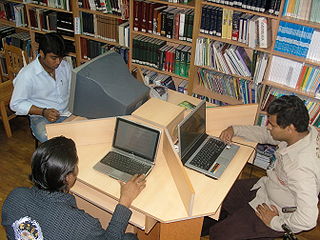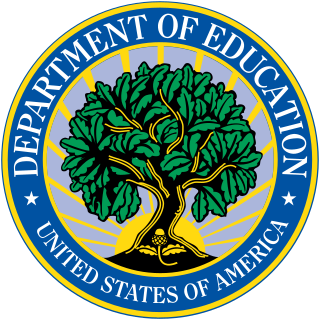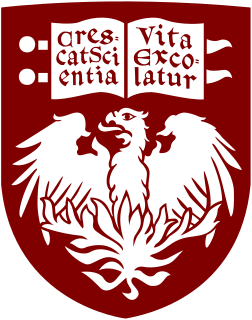
The Library of Congress National Digital Library Program (NDLP) is assembling a digital library of reproductions of primary source materials to support the study of the history and culture of the United States. Begun in 1995 after a five-year pilot project, the program began digitizing selected collections of Library of Congress archival materials that chronicle the nation's rich cultural heritage. In order to reproduce collections of books, pamphlets, motion pictures, manuscripts and sound recordings, the Library has created a wide array of digital entities: bitonal document images, grayscale and color pictorial images, digital video and audio, and searchable e-texts. To provide access to the reproductions, the project developed a range of descriptive elements: bibliographic records, finding aids, and introductory texts and programs, as well as indexing the full texts for certain types of content.
The University of Michigan Library is the university library system of the University of Michigan, based in Ann Arbor, Michigan, in the United States.

Electronic Information for Libraries (EIFL) works with libraries worldwide to enable access to digital information for people in developing and transition countries. They are an international not-for-profit organisation based in Vilnius with a global network of partners.

Project MUSE, a non-profit collaboration between libraries and publishers, is an online database of peer-reviewed academic journals and electronic books. Project MUSE contains digital humanities and social science content from over 250 university presses and scholarly societies around the world. It is an aggregator of digital versions of academic journals, all of which are free of digital rights management (DRM). It operates as a third-party acquisition service like EBSCO, JSTOR, OverDrive, and ProQuest.
The Archive of the Indigenous Languages of Latin America (AILLA) is a digital repository housed in LLILAS Benson Latin American Studies and Collections at the University of Texas at Austin. AILLA is a digital language archive dedicated to the digitization and preservation of primary data, such as audio and video recordings, field notes, texts, and photographs that are in or about Latin American indigenous languages and cultures. AILLA's holdings are available on the Internet and are open to the public wherever privacy and intellectual property concerns are met. AILLA has access portals in both English and Spanish; all metadata are available in both languages, as well as in indigenous languages whenever these metadata are provided.
The University of British Columbia Library is the library system of the University of British Columbia (UBC). In 2014, UBC Library ranked 22nd among members of the Association of Research Libraries.
E. Gene Smith was a scholar of Tibetology, specifically Tibetan literature and history.
The Hamilton Library at the University of Hawaiʻi at Mānoa is the largest research library in the state of Hawaii. The Library serves as a key resource for the flagship Manoa campus as well as the other University of Hawaii system campuses.

The University of Florida Digital Collections (UFDC) are supported by the University of Florida Digital Library Center in the George A. Smathers Libraries at the University of Florida. The University of Florida Digital Collections (UFDC) comprise a constantly growing collection of digital resources from the University of Florida's library collections as well as partner institutions. Opening in April 2006, UFDC has added over 622,114 items - books, newspapers, oral histories, videos, photos, data sets, and more - with over 14 million pages.
A digital library, digital repository, or digital collection, is an online database of digital objects that can include text, still images, audio, video, or other digital media formats. Objects can consist of digitized content like print or photographs, as well as originally produced digital content like word processor files or social media posts. In addition to storing content, digital libraries provide means for organizing, searching, and retrieving the content contained in the collection.

The Khazar University Library and Information Center (KULIC) is the library of Khazar University in Baku. It maintains three branches open to the public: The main library on the Nefchilar Campus; the MBA branch on the downtown Baku campus; and the Alatava campus library.

[[File:|thumb|right|]]
The Digital South Asia Library (DSAL) is a global collaboration to provide universal access to materials for reference and research on South Asian topics, utilizing digital technologies, to scholars, public officials, business leaders, and other users.

Makerere University Library is the main library of Makerere University in Kampala, Uganda. It is the oldest academic library in Uganda, established in 1949. In addition to its primary role as an academic library, it also serves as the national reference library and the legal depository of all works published in Uganda. It has been a depository for the United Nations since 1956.
The SEAlang Library, established in 2005 as an online library source for Southeast Asian linguistic reference materials, was initially funded from the Technological Innovation and Cooperation for Foreign Information Access (TICFIA) program of the U.S. Department of Education, with matching funds from computational linguistics research centers. In 2009, it focused on the non-roman script languages used throughout mainland Southeast Asia. Beginning in 2010 and continuing through 2013, concentration moved to the many languages of maritime Southeast Asia. Resources include bilingual and monolingual dictionaries; monolingual works and aligned bitext works; tools for manipulating, searching, and displaying complex scripts; and specialized reference works that include historical and etymological dictionaries.

David Francis Germano is an American Tibetologist and Professor of Tibetan and Buddhist Studies at the University of Virginia (UVa), the largest Tibetan Studies program in the Americas, where he has taught and researched since 1992. With dual appointments in the School of Nursing and the Department of Religious Studies, Germano currently oversees the work of over twenty graduate students. He is on the board of the International Association of Tibetan Studies and is Editor-in-Chief of The Journal of the International Association of Tibetan Studies (JIATS), a leading journal of Tibetology. In 2000, he founded the Tibetan and Himalayan Library, a digital initiative for collaborative building of knowledge on the region, which he continues to lead as Director. Since 2008 he has also been the co-director of the UVa Tibet Center. More recently, Germano acted as the founding director of SHANTI at the UVa. Since 2011, Germano has also played a leading role in organizing the University of Virginia's Contemplative Sciences Center, which he currently directs.
Himalayan Art Resources (HAR) website is a "virtual museum" of Himalayan and Tibetan art, cataloging and exhibiting images of art from museum, university and private collections throughout the world. The website is hosted at the Rubin Museum of Art.

The Endangered Archive Programme (EAP) is a funding programme and digital archive run by the British Library in London. It has the purpose of preserving cultural heritage where resources may be limited. Each year EAP awards grants to researchers to identify and preserve culturally important archives by digitising them in situ. The original archival material does not leave the country of origin, and projects often incorporate local training and career development. EAP focuses on material created before the mid twentieth century.











